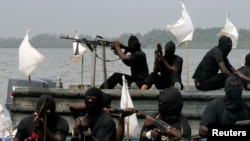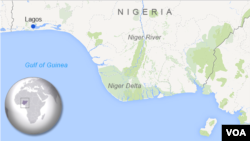A cease-fire between Nigeria’s government and a militant group that has claimed responsibility for a series of crippling attacks on oil infrastructure may be on shaky ground.
A senior official with the Nigerian National Petroleum Corporation told VOA on Tuesday the government had reached a truce with the Niger Delta Avengers militant group.
But the Avengers responded on Twitter saying that no such truce had been reached.
The confusion surrounding the cease-fire shows the challenges President Muhammadu Buhari faces as his administration aims to quell a resurgent militancy in the oil producing Niger Delta region.
“It might be some factionalism. It might be they want to see a credible hand or offer from President Buhari or his government,” said Mark Schroeder, vice president for Africa operations at intelligence firm Stratfor.
Attacks by the Avengers have reduced the output of Africa’s largest producer of crude by as much half from its usual volume of approximately two million barrels per day.
The government recently announced it would downscale its military presence in the region and negotiate with the group.
The Avengers responded with posts on its blog calling for independent mediators, and vowing to reject any talks that don’t produce a plan for “the restoration of the essence of quality human life in the Niger Delta.”
Longstanding grievances
Militancy is nothing new in the southern swamp region, which is deeply impoverished despite being the source of most of Nigeria’s oil wealth.
Insurgents claiming they wanted more development for the area staged a years-long campaign of kidnapping and pipeline bombings. That calmed in 2009 when the government started an amnesty program that paid ex-fighters a monthly stipend and offered job training in exchange for peace.
The government is winding down the amnesty program, but the Avengers have called for its continuation.
Schroeder said many of their other demands reflect longstanding grievances in the Niger Delta, and would be familiar to Buhari and his officials.
The cease-fire may be simply a delay tactic for the government to figure out what to do, he said.
“It could be to buy time while President Buhari has to, essentially, negotiate or calculate among his other political constituencies whether he can afford to increase revenue sharing with the Niger Delta,” Schroeder said.

